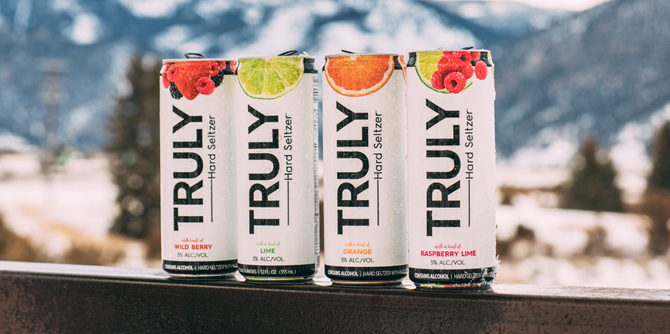
Boston Beer Company’s first-quarter shipments increased 32.5 percent, to a record 1.1 million barrels, in an effort to supply its wholesalers with about six weeks of Truly Hard Seltzer ahead of the summer selling season.
The company — which also makes the Samuel Adams, Twisted Tea and Angry Orchard brands — posted double-digit first-quarter growth in revenue, shipments and depletions. Through the first 13-weeks of 2019, Boston Beer reported a 32.1 percent increase in net revenue, to $61.2 million, along with an 11 percent increase in depletions.
Coming into the year, the company was facing tougher comps, after increasing shipments 15 percent and revenue nearly 18 percent in the first quarter of 2018. After more than doubling its shipment growth in Q1, Boston Beer has adjusted its shipment and depletion growth projections from between 8 and 15 percent to between 10 and 15 percent.
Boston Beer founder and chairman Jim Koch, and CEO Dave Burwick, spent much of Wednesday’s call with investors and analysts discussing the potential of Truly and addressing Samuel Adams’ continued declines.
Despite the launch of several new hard seltzer brands this year, Burwick said Truly and competitor White Claw have maintained control over about 80 percent of the hard seltzer market in scan data, according to market research firm IRI.
“So far, nobody’s really put a dent into the leadership positions of us and White Claw,” Koch added.
According to Burwick, “more than half” of Truly’s volume is coming from drinkers who shop outside of the beer category, primarily in the wine and spirits aisles, while some of the volume is being siphoned from light lagers.
One analyst asked about the longevity of hard seltzer compared to products such as hard sodas, which fell victim to the “boom-splat” phenomenon. Koch said hard sodas were driven by “trial” but failed to garner repeat purchases once consumers discovered they were “loaded with sugar” and high calories. Hard seltzer is different, he explained, because it’s low in sugar and calories. He added that the category is likely to remain relevant even when the growth slows due to “coming down on a bigger volume base.”
“If it triples in volume and the growth rate goes down to 50 percent, that’s still a lot of new cases,” Koch added.
Koch admitted that meeting the demand for Truly has proven challenging. He described the process of packing the seltzer’s variety pack as “ugly” due to the company hiring “hundreds” of temporary day laborers to hand pack the boxes. To ease some of those constraints, the company has purchased an automated canning line, which won’t be operational in time to help alleviate the summer demand.
“My hope is we’re doing just as much contract production next year because we’ve underestimated the volume again,” Koch added.
Nevertheless, Truly’s growth has come at an ever bigger cost. Boston Beer’s first-quarter gross margin declined 1 percent, to 49.5 percent, due to increased use reliance on contract production to build Truly inventories. According to CFO Frank Smalla, the company expects its gross margin to improve as the year progresses.

Meanwhile, after seeing improved trends due to a new advertising campaign for the Samuel Adams brand in Q4, the brand regressed in Q1, Burwick said. He added that the company is hopeful that new packaging, as well as a “lighter and brighter” taste profile for Summer Ale, will help change the brand’s trajectory. Additionally, he said New England IPA is “growing rapidly” in Year Two, while, the company has “some work to do” on Sam ‘76.
“Sam Adams will always be at the heart and soul of the company, but we have evolved our portfolio and our mix to a point where we can deliver nice double digit growth without Sam Adams contributing to it,” Koch said. “It’s just a fact of life at this point that our portfolio is able to grow double digits, despite some of the softer trends in craft beer.”
Asked if retailers and wholesalers are cutting Boston Lager from store shelves due to its declines, Burwick said wholesalers have stood behind the brand. Koch added that Samuel Adams “continues to be the lead craft beer” for many wholesalers.
“We’re not really losing to somebody who is going to replace Sam Adams,” he said. “We’re losing share to the other 7,000 craft brewers.”
According to Koch, Samuel Adams will be a “long-term beneficiary” of a shakeout as retailers shift their product mix and cuts “lower selling craft SKUs.”
“Our overall business is healthy, strong and growing,” Koch added. “And that’s a big advantage over the rest of the craft category where they’ve only got one bet, there are still is on one leg and ours is on four.”
Although Angry Orchard volumes declined in Q1, Burwick said the brand was cycling the national launch of Rosé. He said the cider brand’s trends are expected to rebound and grow with the launch of Angry Orchard Crisp Unfiltered, as well as the introduction of a variety pack, slim cans, and 12-packs of cans and bottles.
“I think that the big overlap is behind us, and now we’re looking toward a different trajectory as the year progresses,” he said.
